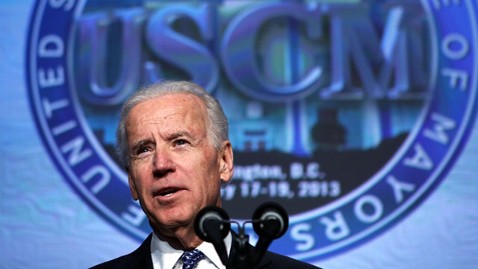Vice President Biden was curt, avoiding confrontation when he sat down with the National Rifle Association and other gun rights advocates. He looked across the table in his ornate conference room and asked the NRA official if his group could back a ban on assault weapons.
“No,” was James J. Baker’s reply.
There was little discussion, no real debate over whether a 1990s ban had worked. The two men simply moved on. Biden, leading a task force to study gun violence, was certain of the course of action President Obama would end up taking, and Baker was just as certain that the NRA would work to stop it.
In the 33 days after the massacre at Sandy Hook Elementary School, gun control rocketed through what one administration official called “a time warp,” transforming from an issue that was politically off-limits to one at the top of Obama’s agenda.
At the center of the transformation was the Biden-led task force. It held 22 meetings, most of them in the same week and many stretching past two hours, Biden furiously scribbling notes in a black leather-bound spiral notebook. The group collected ideas from 229 organizations — or, as Biden put it in a speech last week, “reviewing just about every idea that had been written up only to gather dust on the shelf of some agency.”
The vice president personally placed phone calls, too, including a 45-minute chat one night with the parents of a student who died at Sandy Hook.
“It was like watching an entire term of Senate hearings compressed into a week,” said one administration official who, like others interviewed, spoke on the condition of anonymity to talk candidly. “He was gently interrogating witnesses, following up, finding common ground, finding discrepancies.”
The outcome was never in doubt, however. From the outset, Obama made clear he would champion universal background checks for all gun buyers and bans on assault weapons and high-capacity ammunition magazines.
“I feel like to a certain extent they were checking the box, to say we’ve met with all the stakeholders and now we’re going to do what we’re going to do,” Baker, the NRA lobbyist, said of the task force.
Biden’s task force was less about determining which of the big-ticket items to recommend — it recommended them all — and more about involving each interest group in a process that could build a diverse coalition to lobby Congress.
A strategy took shape to undercut the NRA by appealing to its membership base through more friendly groups, such as evangelical pastors and sportsmen’s associations.
The representative of the hunters group Ducks Unlimited, for instance, presented Biden with a wooden duck decoy. In that meeting, Biden conceded that any push for universal background checks could include exceptions for gun transfers between family members.
“He wasn’t challenging their positions,” said an official. “He was looking for space between their positions and where we are — space where things can happen.”
The task force also provided Biden with his latest prominent role on a high-profile issue. Biden looks to be at the center of every big policy push of the second term, from taxes and debt to the war in Afghanistan. His performance will affect not only his ambitions for a possible third run at the presidency, but also Obama’s legacy. On guns, an issue Biden knows well, he plans to go out on the hustings to rally public support.











